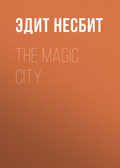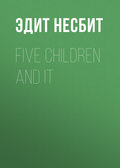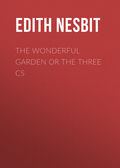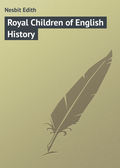полная версия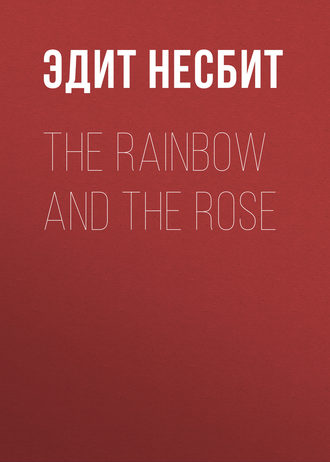

Эдит Несбит
The Rainbow and the Rose
VIII
AT THE GATE
THE monastery towers, as pure and fair
As virgin vows, reached up white hands to Heaven;
The walls, to guard the hidden heart of prayer,
Were strong as sin, and white as sin forgiven;
And there came holy men, by world's woe driven;
And all about the gold-green meadows lay
Flower-decked, like children dear that keep May-holiday.
"Here," said the Abbot, "let us spend our days,
Days sweetened by the lilies of pure prayer,
Hung with white garlands of the rose of praise;
And, lest the World should enter with her snare—
Enter and laugh and take us unaware
With her red rose, her purple and her gold—
Choose we a stranger's hand the porter's keys to hold."
They chose a beggar from the world outside
To keep their worldward door for them, and he,
Filled with a humble and adoring pride,
Built up a wall of proud humility
Between the monastery's sanctity
And the poor, foolish, humble folk who came
To ask for love and care, in the dear Saviour's name.
For when the poor crept to the guarded gate
To ask for succour, when the tired asked rest,
When weary souls, bereft and desolate,
Craved comfort, when the murmur of the oppressed
Surged round the grove where prayer had made her nest,
The porter bade such take their griefs away,
And at some other door their bane and burden lay.
"For this," he said, "is the white house of prayer,
Where day and night the holy voices rise
Through the chill trouble of our earthly air,
And enter at the gate of Paradise.
Trample no more our flower-fields in such wise,
Nor crave the alms of our deep-laden bough;
The prayers of holy men are alms enough, I trow."
So, seeing that no sick or sorrowing folk
Came ever to be healed or comforted,
The Abbot to his brothers gladly spoke:
"God has accepted our poor prayers," he said;
"Over our land His answering smile is spread.
He has put forth His strong and loving hand,
And sorrow and sin and pain have ceased in all the land.
"So make we yet more rich our hymns of praise,
Warm we our prayers against our happy heart.
Since God hath taken the gift of all our days
To make a spell that bids all wrong depart,
Has turned our praise to balm for the world's smart,
Fulfilled of prayer and praise be every hour,
For God transfigures praise, and transmutes prayer, to power."
So went the years. The flowers blossomed now
Untrampled by the dusty, weary feet;
Unbroken hung the green and golden bough,
For none came now to ask for fruit or meat,
For ghostly food, or common bread to eat;
And dreaming, praying, the monks were satisfied,
Till, God remembering him, the beggar-porter died.
When they had covered up the foolish head,
And on the foolish loving heart heaped clay,
"Which of us, brothers, now," the Abbot said,
"Will face the world, to keep the world away?"
But all their hearts were hard with prayer, and "Nay,"
They cried, "ah, bid us not our prayers to leave;
Ah, father, not to-day, for this is Easter Eve".
And, while they murmured, to their midst there came
A beggar saying, "Brothers, peace, be still!
I am your Brother, in our Father's name,
And I will be your porter, if ye will,
Guarding your gate with what I have of skill".
So all they welcomed him and closed the door,
And gat them gladly back unto their prayers once more.
But, lo! no sooner did the prayer arise,
A golden flame athwart the chancel dim,
Then came the porter crying, "Haste, arise!
A sick old man waits you to tend on him;
And many wait—a knight whose wound gapes grim,
A red-stained man, with red sins to confess,
A mother pale, who brings her child for you to bless".
The brothers hastened to the gate, and there
With unaccustomed hand and voice they tried
To ease the body's pain, the spirit's care;
But ere the task was done, the porter cried:
"Behold, the Lord sets your gate open wide,
For here be starving folk who must be fed,
And little ones that cry for love and daily bread!"
And, with each slow-foot hour, came ever a throng
Of piteous wanderers, sinful folk and sad,
And still the brothers ministered, but long
The day seemed, with no prayer to make them glad;
No holy, meditative joys they had,
No moment's brooding-place could poor prayer find,
Mid all those heart to heal and all those wounds to bind.
And when the crowded, sunlit day at last
Left the field lonely with its trampled flowers,
Into the chapel's peace the brothers passed
To quell the memory of those hurrying hours.
"Our holy time," they said, "once more is ours!
Come, let us pay our debt of prayer and praise,
Forgetting in God's light the darkness of man's ways!"
But, ere their voices reached the first psalm's end,
They heard a new, strange rustling round their house;
Then came the porter: "Here comes many a friend,
Pushing aside your budding orchard boughs;
Come, brothers, justify your holy vows.
Here be God's patient, poor, four-footed things
Seek healing at God's well, whence loving-kindness springs."
Then cried the Abbot in a vexed amaze,
"Our brethren we must aid, if 'tis God's will;
But the wild creatures of the forest ways
Himself God heals with His Almighty skill.
And charity is good, and love—but still
God shall not look in vain for the white prayers
We send on silver feet to climb the starry stairs;
"For, of all worthy things, prayer has most worth,
It rises like sweet incense up to heaven,
And from God's hand falls back upon the earth,
Being of heavenly bread the accepted leaven.
Through prayer is virtue saved and sin forgiven;
In prayer the impulse and the force are found
That bring in purple and gold the fruitful seasons round.
"For prayer comes down from heaven in the sun
That giveth life and joy to all things made;
Prayer falls in rain to make broad rivers run
And quickens the seeds in earth's brown bosom laid;
By prayer the red-hung branch is earthward weighed,
By prayer the barn grows full, and full the fold,
For by man's prayer God works his wonders manifold."
The porter seemed to bow to the reproof;
But when the echo of the night's last prayer
Died in the mystery of the vaulted roof,
A whispered memory in the hallowed air,
The Abbot turned to find him standing there.
"Brother," he said, "I have healed the woodland things
And they go happy and whole—blessing Love's ministerings,
"And, having healed them, I shall crave your leave
To leave you—for to-night I journey far.
But I have kept your gate this Easter Eve,
And now your house to heaven shines like a star
To show the Angels where God's children are;
And in this day your house has served God more
Than in the praise and prayer of all its years before.
"Yet I must leave you, though I fain would stay,
For there are other gates I go to keep
Of houses round whose walls, long day by day,
Shut out of hope and love, poor sinners weep—
Barred folds that keep out God's poor wandering sheep—
I must teach these that gates where God comes in
Must not be shut at all to pain, or want, or sin.
"The voice of prayer is very soft and weak,
And sorrow and sin have voices very strong;
Prayer is not heard in heaven when those twain speak,
The voice of prayer faints in the voice of wrong
By the just man endured—oh, Lord, how long?—
If ye would have your prayers in heaven be heard,
Look that wrong clamour not with too intense a word.
"But when true love is shed on want and sin,
Their cry is changed, and grows to such a voice
As clamours sweetly at heaven to be let in—
Such sound as makes the saints in heaven rejoice;
Pure gold of prayer, purged of the vain alloys
Of idleness—that is the sound most dear
Of all the earthly sounds God leans from heaven to hear.
"Oh, brother, I must leave thee, and for me
The work is heavy, and the burden great.
Thine be this charge I lay upon thee: See
That never again stands barred thy abbey gate;
Look that God's poor be not left desolate;
Ah me! that chidden my shepherds needs must be
When my poor wandering sheep have so great need of me.
"Brother, forgive thy Brother if he chide,
Thy Brother loves thee—and has loved—for see
The nails are in my hands, and in my side
The spear-wound; and the thorns weigh heavily
Upon my brow—brother, I died for thee—
For thee, and for my sheep that are astray,
And rose to live for thee, and them, on Easter Day!"
"My Master and my Lord!" the Abbot cried.
But, where that face had been, shone the new day;
Only on the marble by the Abbot's side,
Where those dear feet had stood, a lily lay—
A lily white for the white Easter Day.
He sought the gate—no sorrow clamoured there—
And, not till then, he dared to sink his soul in prayer.
And from that day himself he kept the gate
Wide open; and the poor from far and wide,
The weary, and wicked, and disconsolate,
Came there for succour and were not denied;
The sick were healed, the repentant sanctified;
And from their hearts rises more prayer and praise
Than ever the abbey knew in all its prayer-filled days.
And there the Heavenly vision comes no more,
Only, each Easter now, a lily sweet
Lies white and dewy on the chancel floor
Where once had stood the beloved wounded feet;
And the old Abbot feels the nearing beat
Of wings that bring him leave at last to go
And meet his Master, where the immortal lilies grow.
VIA AMORIS
I
IT is not Love, this beautiful unrest,
This tremor of longing that invades my breast:
For Love is in his grave this many a year,
He will not rise—I do not wish him here.
It is not memory, for your face and eyes
Are not reflected where that dark pool lies:
It is not hope, for life makes no amends,
And hope and I are long no longer friends:
It is a ghost out of another Spring
It needs but little for its comforting—
That I should hold your hand and see your face
And muse a little in this quiet place,
Where, through the silence, I can hear you sigh
And feel you sadden, O Virgin Mystery,
And know my thought has in your thought begot
Sadness, its child, and that you know it not.
II
If this were Love, if all this bitter pain
Were but the birth-pang of Love born again,
If through the doubts and dreams resolved, smiled
The prophetic promise of the holy child,
What should I gain? The Love whose dream-lips smiled
Could never be my own and only child,
But to Love's birth would come, with the last pain,
Renunciation, also born again.
III
If this were Love why should I turn away?
Am I not, too, made of the common clay?
Is life so fair, am I so fortunate,
I can refuse the capricious gift of Fate,
The sudden glory, the unhoped-for flowers,
The transfiguration of my earthly hours?
Come, Love! the house is garnished and is swept,
Washed clean with all the tears that I have wept,
Washed from the stain of my unworthy fears,
Hung with the splendid spoils of wasted years,
Lighted with lamps of hope, and curtained fast
Against the gathered darkness of the past.
I draw the bolts! I throw the portals wide,
The darkness rushes shivering to my side,
Love is not here—the darkness creeps about
My house wherein the lamps of hope die out.
Ah Love! it was not then your hand that came
Beating my door? your voice that called my name?
IV
"It is not Love, it is not Love," I said,
And bowed in fearful hope my trembling head.
"It is not Love, for Love could never rise
Out of the rock-hewn grave wherein he lies."
But as I spake, the heavenly form drew near
Where close I clasped a hope grown keen as fear,
Upon my head His very hand He laid
And whispered, "It is I, be not afraid!"
V
And this is Love, no rose-crowned laughing guest
By whom my passionate heart should be caressed,
But one re-risen from the grave; austere,
Cold as the grave, and infinitely dear,
To follow whom I lay the whole world down,
Take up the cross, bind on the thorny crown;
And, following whom, my bleeding pilgrim feet
Find the rough pathway sure and very sweet.
The august environment of mighty wings
Shuts out the snare of vain imaginings,
For by my side, crowned with Love's death-white rose,
The Angel of Renunciation goes.
RETRO SATHANAS
"REFUSE, refrain: for this is not the love
The Annunciation Angel warned you of;
This is the little candle, not the sun;
It burns, but will not warm, unhappy one!"
"But ah! suppose the sun should never shine,
Then what an anguish of regret were mine
To know that even from this I turned away!
Candles may serve, if there should be no day."
"Nay, better to go cold your whole life long
Than do the sun, than do your soul such wrong:
And if the sun shine not, be life's the blame
And yours the pride, who scorned the meaner flame."
THE OLD DISPENSATION
O THOU, who, high in heaven,
To man hast given
This clouded earthly life
All storm and strife,
Blasted with ice and fire,
Love and desire,
Filled with dead faith, and love
That change is master of—
O Thou, who mightest have given
To all Thy heaven,
But who, instead, didst give
This life we live—
Who feedest with blood and tears
The hungry years—
I make one prayer to Thee,
O Great God! grant it me.
Some day when summer shows
Her leaf, her rose,
God, let Thy sinner lie
Under Thy sky,
And feel Thy sun's large grace
Upon his face;
Then grant him this, that he
May not believe in Thee!
THE NEW DISPENSATION
OUT in the sun the buttercups are gold,
The daisies silver all the grassy lane,
And spring has given love a flower to hold,
And love lays blindness on the eyes of pain.
Within are still, chill aisles and blazoned panes
And carven tombs where memory weeps no more.
And from the lost and holy days remains
One saint beside the long-closed western door.
Outside the world goes laughing lest it weep,
With here and there some happy child at play;
A mother worshipping the babe asleep,
Or two young lovers dreaming 'neath the May.
Within, the soul of love broods o'er the place;
The carven saint forgotten many a year
Still lifts to heaven his rapt adoring face
To pray, for those who leave him lonely here,
That once again the silent church may ring
With songs of joy triumphant over pain—
Ah! God, who makest the miracle of spring
Make Thou dead faith and love to rise again.
THE THREE KINGS
WHEN the star in the East was lit to shine
The three kings journeyed to Palestine;
They came from the uttermost parts of earth
With long trains laden with gifts of worth.
The first king rode on a camel's back,
He came from the land where the kings are black,
Bringing treasures desired of kings,
Rubies and ivory and precious things.
An elephant carried the second king,
He came from the land of the sun-rising,
And gems and gold and spices he bare
With broidered raiment for kings to wear.
The third king came without steed or train
From the misty land where the white kings reign.
He bore no gifts save the myrrh in his hand,
For he came on foot from a far-off land.
Now when they had travelled a-many days
Through tangled forests and desert ways,
By angry seas and by paths thorn-set
On Christmas Vigil the three kings met.
And over their meeting a shrouded sky
Made dark the star they had travelled by.
Then the first king spake and he frowned and said:
"By some ill spell have our feet been led,
"Now I see in the darkness the fools we are
To follow the light of a lying star.
"Let us fool no more, but like kings and men
Each get him home to his land again!"
Then the second king with the weary face,
Gold-tinct as the sun of his reigning place,
Lifted sad eyes to the clouds and said,
"It was but a dream and the dream is sped.
"We dreamed of a star that rose new and fair,
But it sets in the night of the old despair.
"Yet night is faithful though stars betray,
It will lead to our kingdoms far away."
Then spake the king who had fared alone
From the far-off kingdom, the white-hung throne:
"O brothers, brothers, so very far
Ye have followed the light of the radiant star,
"And because for a while ye see it not
Shall its faithful shining be all forgot?
"On the spirit's pathway the light still lies
Though the star be hid from our longing eyes.
"To-morrow our star will be bright once more



